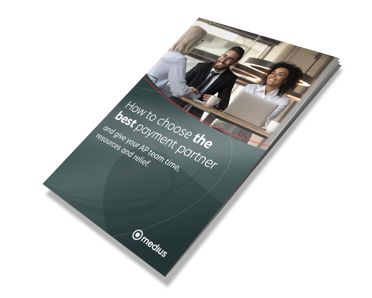Benefits of implementing a payment processing system
- What is a payment processing system?
- What challenges do payment processing systems solve for businesses?
- What are the benefits of using an online payment system for your business?
- What are common challenges when using a payment processing system?
- What should businesses consider when choosing an online payment processor?
- How to make the most of your payments processing system
- How does AI enhance payment processing security?
- How does payment processing fit into AP automation?
- Benefits of centralizing payments in one platform
- Why use Medius for your payment processing system?
Hear what's covered in this article:
What is a payment processing system?
A payment processing platform is what a business uses to complete credit and debit card transactions with their customers.
The payment processing company provides a business with a merchant account that allows it to accept digital payment methods like specific brands of credit cards, digital wallets, debit cards, or even cryptocurrency.
The payment processor will generally charge transaction fees for access to their payment gateway in return for their service. This may be a flat per-transaction amount or a percentage of the total.

Accepting credit and debit cards or other electronic payment options benefits a business and its customers. Most transactions in the global market today are digital payments.
The end consumer is not the sole beneficiary of online payment processing. Larger companies can supplement their payment processing options with electronic payment methods. Often vendors appreciate the speed and simplicity of these methods of payment over paper checks.
What challenges do payment processing systems solve for businesses?
Doing business involves many challenges. Payment processing can address some challenges while providing convenient and fast payment options.
Consider some challenges directly addressed by working with a reputable payment processing platform.
Security risks
There are inherent risks to handling customer data. Reputable payment processors use a variety of security measures to combat these risks.
Payment processing companies spend a lot of money ensuring their secure payment gateways. This includes technologies like EMV-chip support and tokenization to encrypt card data.
The Payment Card Industry Data Security Standard (PCI-DSS) is a set of policies that payment processors work to achieve annually so that security best practices are followed.
Manual payments
Manual payments are prone to high costs and may be prohibitively expensive as a business scales up. They take more time to complete and are susceptible to data entry errors that take time and money to correct.
Record-keeping is another factor that increases the manual work that must be performed and adds to the overall length of the payment process when using these inefficient methods.
Slow processes
Traditional payment methods can take days or weeks to process. Digital payments are nearly instantaneous.
Speedy payments provide a better user experience for the consumer and businesses. Companies that make electronic payments are often better able to compete in the fast-paced business world.
Vendors and suppliers appreciate it when companies can avoid late payments, which leads to better supplier relationships and more favorable contract terms.
Lack of visibility and control
Reducing payment times helps businesses better view their current state of affairs. Executives can track cash flow in real-time to make more informed business decisions.
Paper payment processes limit this visibility and steal away control of the business process with company funds tied up in lengthy payment processes.
What are the benefits of using an online payment system for your business?
There are tangible benefits of online payment systems for buyers and sellers. Look at some benefits your business can experience by implementing payment processing.
Increase efficiency
Any tool that can reduce wait times will improve a business's efficiency. Online payment systems accomplish this by providing secure and speedy channels to take, authorize, and complete electronic payments.
Transaction times shrink from days or weeks to a matter of seconds.
Reduce costs
Sending and receiving payments via paper checks can result in high processing fees for a company. Businesses may face bank fees, printing and postage costs, and secure disposal charges.
Ultimately, digital payments are a green solution that can have less or even zero environmental impact.
Improve security
Security is a concern when handling sensitive data like customer’s credit card information and routing numbers.
Some may believe that it is more secure to avoid online payment solutions because it limits access to customer data from cybercriminals.
But there are security dangers from manual processes as well. When a payment processor follows safety and security practices, it can provide a secure environment without damaging customer data.
For example, PCI-compliant payment processors must pass annual security audits by third-party verifiers. This certification signals the company is trustworthy and follows industry standards in data handling.
Improve customer service and experience
Partnering with a payment processing service directly boosts the customer experience. Most customers are familiar with and prefer to use digital payments over manual ones.
A company that provides multiple methods of payment – paper checks, credit cards, ACH, wire transfers, or digital wallets – will see higher customer satisfaction rates.
Reduce fraud
Digital payments use secure and encrypted channels, making it difficult for bad actors to carry out fraudulent transactions.
Customers can be confident that their electronic payments are secure when paired with features like multi-factor authentication (MFA).
Increase compliance
Payment processors for digital payments allow a company to achieve industry standards and follow best practices.
The PCI-DSS certification is the gold standard for security compliance, proving a company complies with data-handling practices and is independently checked annually.
Using digital payments often makes internal compliance an easier process as well. Electronic records may be more easily scanned for errors and cross-checked against other documents like requisitions and invoices.
Reduce stress
Accounts payable (AP) departments tend to be understaffed and overworked. A payment processor that improves payment and spending management methods will be a helpful tool for these business professionals.
Enhance analytics and reporting
Payment processing platforms may have advanced metrics that give a deeper look at a company's financial situation.
Analytics allow accounts payable staffers to monitor performance and spot issues and exceptions as they arise.
Reports can also give insight into other data points that will improve Efficiency and revenue:
- Customer-preferred payment methods
- Product and service selling trends
- Viable periods of increased sales
- Filtered data based on custom parameters
Granting access to aggregate data helps to avoid data silo situations where only one or two employees understand and limit decision-making ability.
System integration
Most companies rely on multiple software systems to support their business operations, and paper processes are difficult to integrate into separate software packages.
Likely, accounts payable staff will be left entering data manually multiple times, which introduces an avenue for errors to creep into data.
Having an end-to-end digital process keeps data stored electronically, making it easier to import from one system to another.
For more information on this subject, read this post to see the surprising benefits a business can experience when managing their payments all in one place with solutions from Medius.
What are common challenges when using a payment processing system?
Some challenges arise when using a payment processing system. However, these issues can be addressed with a solution that contains the right features. Read on to see how you can address these challenges.
Integration issues
Most businesses need to start their digital transformation from scratch. Software packages that manage aspects of their business process are already in use, such as enterprise resource planning (ERP) software.
New additions to their tool bag need to work seamlessly with current and future systems. Otherwise, the return on investment will be diminished.
Medius handles integration issues with pre-built connectors out of the box to popular financial systems. Powerful, custom-built rest APIs allow for further integrations so that you are never left with systems that don’t speak with one another.
Processing costs
Payment processing costs are one roadblock to adoption for some companies. Setup fees and ongoing transaction costs can make payment processors less attractive to businesses.
Remembering the long-term benefits of accepting credit cards and other payment methods is important. The increased sales and ease of use a business can experience in paying its invoices electronically will likely far outweigh associated costs.
Before implementation, a thorough review of the total cost of doing business should be made to present a comparison post-implementation to interested stakeholders.
Non-compliant processors
Security compliance is a hot topic, and the increase in cybersecurity incidents globally causes some companies to pause implementing electronic payment systems.
A reputable partner is certainly a necessity. Look for PCI-DSS-certified solutions and maintain high internal standards for data management.
Lack of support
Continuing support is a key way a payment processor proves its value to its partners. This support should come at every stage of the implementation process and beyond.
Onboarding education for staff and support through compliance issues strengthens partner relationships and ensures that payment processing solutions are used effectively.
What should businesses consider when choosing an online payment processor?
The benefits of payment processing are clear. But which payment processor should you choose for your business? Consider several factors that should be weighed in your decision.
Transaction volume
The number of transactions that a business processes monthly is critical when choosing a payment processing platform.
Some processors are better equipped to handle high volumes of transactions, while others are more suited to small businesses.
Consider factors like sliding fee scales that change when transaction volumes ramp up. Make sure to estimate potential growth and seasonal changes in business flow too.
Payment types
Some payment processors may specialize in specific payment types, such as credit cards, ACH payments, or wire transfers.
Ensure that the payment processor supports the payment methods that will drive customer satisfaction and internal operations like invoice payments.
Security
A crucial consideration for any business is Security. Robust security features like encryption, tokenization, and fraud detection are vital for protecting financial data.
Before partnering with a payment processor, ensure they have a stellar reputation for upholding safe data practices.
Cost
Payment processing fees can vary widely from one provider to another. Evaluate costs associated with all options. Likely fees will be structured according to a set model:
- Flat rates per transaction
- Percentage of the transaction amount
- A combination of both
Find a partner that works with you, not against you
The speed of new payment technologies can feel overwhelming, especially when your team is already stretched thin. The “How to choose the best payment automation provider guide” helps you cut through the noise and focus on what really matters: a solution that makes payments simpler, safer, and more reliable for your business.

How to make the most of your payments processing system
When choosing a payment processing platform, you want to get the most bang for your buck. Consider three ways you can make sure your solution is working for you.
Complete upfront work to integrate your payment solution with other data warehouses and financial systems.
Integrated software opens the data to become more valuable to your company. Not only is data not being re-entered into separate systems – wasting time and money - but the data you do have becomes actionable.
Key metrics become real-time and paint a more in-depth picture of your business’s financial health.
Fraud detection tools help protect a company and its customers from costly breaches. These tools provide peace of mind and are a first defense in combating fraud.
Here are some common fraud detection tools used by payment processors:
- Address Verification – This compares the billing address used during purchase with the billing address on file with an issuing bank. If there is a mismatch, an alert may be triggered.
- Card Verification Code (CVC) – A code on the back of a credit or debit card entered at the time of purchase can help verify that the person using the card has physical possession.
- Geo-location – This tool detects if the transaction originates from an unexpected location.
- Machine learning and AI – These tools detect purchase patterns and may indicate fraud when unusual patterns are detected over time.
- Velocity Checks – This tool detects if multiple transactions are being attempted quickly, which may indicate an attempt to use stolen payment information.
After implementation, work with your payment processor to review reports detailing payments. Robust reporting will show details like the number of transactions per payment type and average transaction value.
These metrics will help business executives make smart decisions as they look toward the future of their company.
How does AI enhance payment processing security?

AI-driven security tools are transforming how B2B organizations protect their payment environments. Traditional fraud prevention relied heavily on static rules and manual oversight. Now, modern systems use artificial intelligence and machine learning to detect fraud patterns dynamically, flagging suspicious behavior in real time and helping prevent attacks before they escalate.
These tools analyze massive volumes of payment data and learn from historical trends to detect anomalies, like inconsistent spending behavior, abnormal payment locations, or repeated failed attempts, all without human intervention. For example, AI can automatically trigger alerts when a vendor's banking information changes unexpectedly or when an invoice is processed outside of typical business hours.
These capabilities significantly reduce the likelihood of business email compromise (BEC), invoice redirection scams, and other common payment fraud schemes. By layering AI-driven risk scoring with traditional security practices like MFA and encryption, AP teams can take a proactive approach to fraud mitigation.
For more on this, see how Medius uses AI to combat deepfake and invoice fraud.
How does payment processing fit into AP automation?
Payment processing should never be viewed in isolation. In a truly modern finance function, it’s a critical part of a broader accounts payable automation strategy, working hand-in-hand with invoice management, approval workflows, vendor onboarding, and reconciliation tools. When these systems are integrated, businesses can eliminate manual handoffs, reduce risk, and dramatically improve cycle times.
For example, a digital invoice can be received, coded, and approved within a single platform, then immediately scheduled for payment via ACH, wire, or virtual card, all without leaving the system. That level of end-to-end automation not only reduces labor but also boosts visibility into cash flow and liabilities.
Medius helps facilitate this holistic approach with AP automation and Medius Payments, giving finance teams the control they need over every stage of the procure-to-pay process. This is especially valuable for enterprise businesses managing hundreds of vendors and recurring spend.
Benefits of centralizing payments in one platform
Using multiple systems for payment management leads to siloed data, increased reconciliation efforts, and higher fraud exposure. Centralizing vendor payments through a unified platform like Medius helps:
Reduce data entry errors
Unify reporting across AP and treasury
Enforce consistent approval workflows
Manage all payment types (ACH, virtual cards, wires) from one interface
Why use Medius for your payment processing system?
We know you have options for a payment processing system, and here's why Medius is the right choice for your business.
Medius Payments
Medius Payments works to streamline your payment process. Not only does it replace outdated and high-risk methods, but it supports business-to-business payments with features like:
- Virtual cards that work with existing standards and provide a more secure and integrated process
- Payment automation with ACH remittance
- Support for multiple payment methods like offsite and local check printing and wire transfers
- Detailed reporting and full audit trails of transactions

Medius makes AP automation a reality by using intelligent technology to change how invoices move into and throughout your business. This results in a faster and more efficient overall payment process.
Download the Medius Payments Product Sheet to see how your process can become efficient, transparent, and cost-effective.
Book a demo or contact us today to get started on a solution that takes the complexity out of payments and puts control back in your hands.





